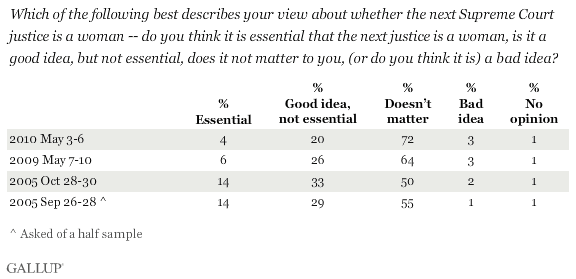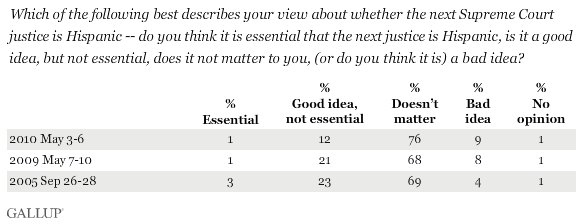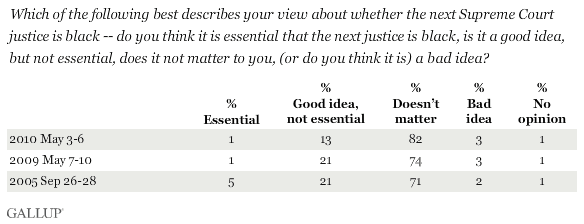PRINCETON, NJ -- The majority of Americans say it doesn't matter to them whether President Obama nominates a Protestant to replace retiring Supreme Court Justice John Paul Stevens, the only Protestant now on the court. As has been the case with previous vacancies, a majority of Americans say the same about a potential minority or female nominee.
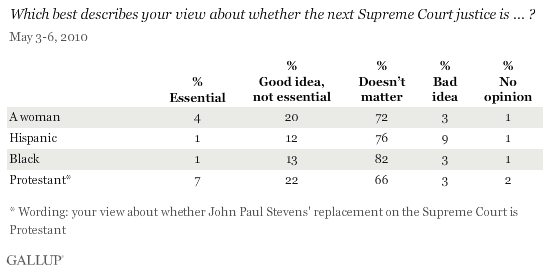
Justice Stevens announced his resignation from the court last month, and Obama is widely expected to announce his nominee to replace Stevens in the next several days. As is typically the case, there has been speculation about how a new justice would affect the composition of the court. At the moment, the court includes two female justices (Ruth Bader Ginsburg and Sonia Sotomayor), one Hispanic (Sotomayor), and one black (Clarence Thomas). With Stevens' departure, all of the eight remaining justices are Catholic or Jewish, fueling a call from some quarters for the appointment of a Protestant -- the majority religious group in America.
No Protestants on the Court?
Respondents in Gallup's May 3-6 survey were reminded that when Justice Stevens resigns, "none of the eight remaining Supreme Court justices will be of a Protestant religion." Even with this direct statement, only 7% of those interviewed said it was essential that the new justice be a Protestant, while another 22% said it was a good idea, but not essential, and 66% said it didn't matter.
Sentiment in favor of Obama's appointing a Protestant is higher among Protestants than among Americans who identify with another religious faith or have no religious identity at all. Four out of 10 Protestants say it is essential (10%) or a good idea (30%) that the next justice be a Protestant.
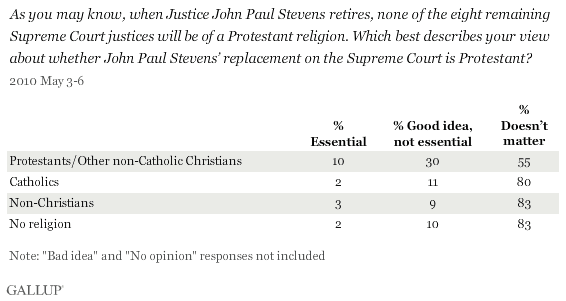
Gender, Race, and Ethnicity Not Important Factors
The 24% of Americans who say it is essential or a good idea that the next justice be a woman is slightly lower than the 32% in a ���۴�ýpoll conducted last May -- before Obama announced Sotomayor as his nominee. It is possible that the slight decrease in sentiment in favor of a female nominee reflects the fact that with Sotomayor's confirmation, the court now includes two female justices.
Thirty percent of women say it is essential or a good idea for the next Supreme Court justice to be a woman, compared to 19% of men; both percentages are down from last year.
Seventy-six percent of Americans say it doesn't matter to them whether Obama nominates a Hispanic, up from 68% last May. While this increase in indifference to the possibility of a Hispanic nominee may reflect the fact that Sotomayor's appointment gave the court its first-ever Hispanic justice, Americans have also this year become less likely to say it matters to them whether the next nominee is black. (Complete trend tables on these questions appear on Page 2 of this report.)
Americans Prefer a Nominee Who Would Tilt the Court More Conservative
Justice Stevens has been one of the Supreme Court's more reliable liberal votes. Given Obama's political leanings, it is likely that he will select a left-leaning replacement who would essentially keep the ideological composition of the court intact.
Americans, however, would prefer a new Supreme Court justice who makes the court more conservative (42%) over one who would make the Court more liberal (27%). ���۴�ýfound essentially the same result last May prior to Obama's nomination of Sotomayor to replace David Souter.
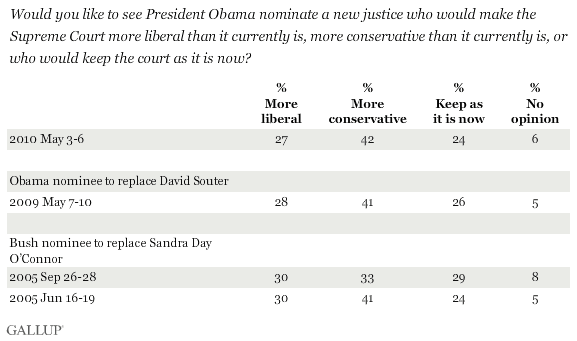
This tilt in preference for a more conservative makeup of the new court reflects the in America. So far this year, 42% of those interviewed in ���۴�ýsurveys have identified themselves as conservative, 35% as moderate, and 20% as liberal.
Implications
reported Friday that President Obama will announce Solicitor General Elena Kagan as his nominee around the beginning of next week. Kagan is a woman, is not a Protestant, and is neither Hispanic nor black. As was the case a year ago, it appears that none of these demographic characteristics will matter to Americans if Kagan is in fact the nominee. However, her political orientation would most likely not fit with the plurality of Americans' wishes to move the court in a more conservative direction.
Results are based on telephone interviews with 1,029 national adults, aged 18 and older, conducted May 3-6, 2010. For results based on the total sample of national adults, one can say with 95% confidence that the maximum margin of sampling error is ±4 percentage points.
Interviews are conducted with respondents on landline telephones (for respondents with a landline telephone) and cellular phones (for respondents who are cell phone only).
In addition to sampling error, question wording and practical difficulties in conducting surveys can introduce error or bias into the findings of public opinion polls.
